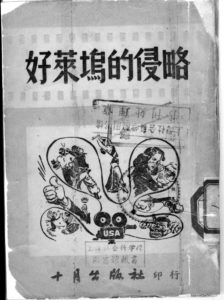The Invasion by Hollywood (1951)
The Invasion by Hollywood (1951)
The small booklet Invasion by Hollywood (Haolaiwu de qinlüe 好萊塢的侵略) is a 1951 publication by the Shiyue chubanshe 十月出版社. It is a collection of articles denouncing movies and the American influence on movies previously published in different journals. The collection mainly consists of newspaper articles by David Piatt, an American communist film critic, which were translated from English into an abridged Chinese version by readers of the New York Labour Times, but also of some texts contributed by Chinese authors.
The first article Hollywood movies (Haolaiwu dianying 好萊塢電影) divides the world of movies into two prevalent camps: the Communist camp and the mainstream American camp. Chinese as well as Soviet Communist movies are labeled harmonious, made for the labour force with the objective to educate on labour, whereas Hollywood movies are labeled as gangster movies. The main topic here is the killing of people. Other themes might be police and imperial movies, but none employ scenes of harmony as do communist films.
As the central motive seems to be the killing of people, Hollywood movies are described as brutal and savage, also as anti-social and anti-human. The author fears that society might take up on these behaviors and might try to imitate them. But not only are the movies’ topics ruthless, they also attempt to discredit sympathies towards communism, Piatt mentions the movie The Woman on Pier 13 (Alternative title: I married a Communist, released in 1949) as an example. In further search of the harmony-theme the author then ventures towards ‘friendship movies’, all of which seem to feature the so-called “blacks’ fight for freedom”.
Apart from these content related examinations, the author remarks that the whole industry in the background is an anti-social construct, as the industry’s capital is only wielded by few production companies.
The third article in this short book is a translation of a text stemming from a London newspaper called Communist Review. It is titled Hollywood’s Art of Killing (Haolaiwu de sharen yishu 好萊塢的殺人藝術) and debates why crime rates in the US have been rising. Piatt connects the horrors of war with the topicalization of murder, violence and crime in Hollywood cinema. He points out that mainly lower social classes are involved in these crimes, as they resist the wealthy. Also, he observes that suddenly, after the war, female villains are shown and punished on-screen, when before they never appeared in these roles. By listing some of the crudest movies in his opinion and by giving examples of how these movies and negative topics affect real-life criminality, Piatt emphasizes the bad influence these movies have on society. Piatt does not argue for a harmonious society in this article but he frequently stresses the fact, that American movies tend to display anti-social behavior which goes against human nature.
Another article elaborates on the Invasion [of Chinese cinemas] by Hollywood (Haolaiwu de qinlüe 好萊塢的侵略). The author criticizes the fact that US movies make up the large part of ticket sales in Chinese cinemas and claims that from the money from US movie ticket sales during the last five years (1945 – 1950) in China, Chinese directors could make 1800 Chinese movies. This implies that most of the money made through ticket sales goes back to the USA instead of supporting the Chinese movie industry. It is not only necessary to try to prohibit the showing of US movies because of the money that is transferred back to the USA, but also because these movies “poison the Chinese people“, as already elaborated on in the articles above.
In order to rid China of US movies the author suggests an increase in Chinese productions to meet the demand of the Chinese where movies and entertainment are concerned. Also, this text touches upon the fear of US infiltration of the Chinese market through movies. Apart from prohibiting US movies completely, another suggestion to control movie airings is made: the movies to be shown on screen were to be monitored and scheduled by a chosen authority.
Renée Krusche
